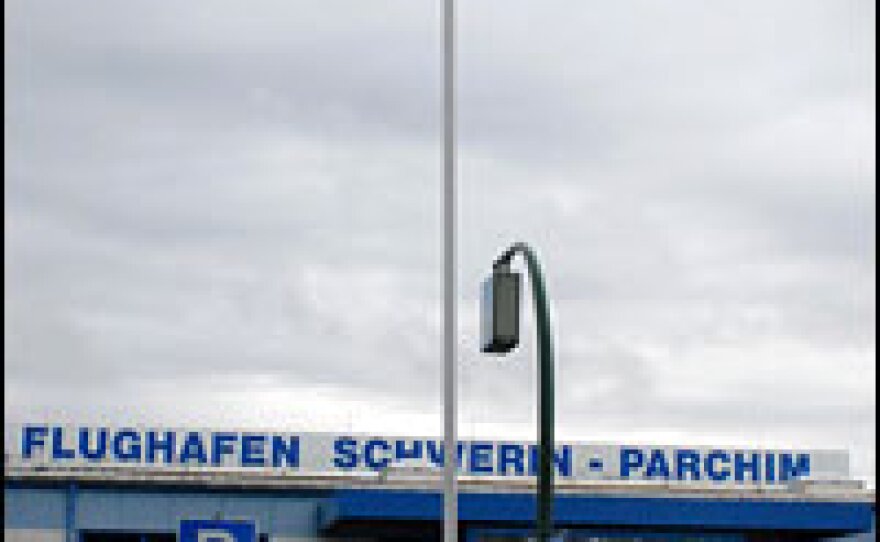
Chinese companies are increasingly turning to Europe as they look to expand their markets.
One Chinese company has spent nearly $50 million to gain a shipping foothold in the heart of Europe, taking over a German cargo airport.
Chinese goods may soon be assembled nearby in order to receive a coveted "Made in Germany" label.
Buying A German Airport
Eastern Germany's Parchim International Airport has its own place in aviation history. The Nazis based the world's first jetfighters here.
After World War II, it became a Soviet air base. The Soviets left after the Berlin Wall fell — and so did most of the jobs.
The airport is used mostly by private planes and isn't very busy these days. But that will soon change.
A Chinese flag now flies above the terminal in honor of LinkGlobal Logistics, a Chinese firm that bought the airport for $47 million.
"This airport is one of the rare airports in Europe to operate 24 hours without time restrictions," says Jonathan Pang, LinkGlobal's chief executive officer.
Industrial Synergy
That's vital in the air cargo business, as are the long runways Parchim inherited from its military past. They're big enough to land a fully loaded jumbo jet. And although Parchim is surrounded by countryside, it's only a few hours by car to Berlin and Hamburg.
An Australian firm, Goodman International, will spend another $160 million developing the surrounding real estate into a giant logistics and industrial park. Construction is set to begin in August.
"Many companies in China are highly interested to do the final assembling of their products in Germany, to get the label, 'Made in Germany,'" says Werner Knan, who runs Goodman's business in Germany.
Partially made clothes and electronics will be flown into Parchim and completed at the nearby industrial park. The finished goods will be shipped to Europe, Africa and the rest of the world.
The German government wants profits from Chinese goods sold in the country to stay in Germany; that's why it's encouraging this kind of Chinese investment.
"Trade policy can't be a one-way street," says Lutz Werner, an official with the Ministry of Economics and Technology. "German firms have invested billions in China. Therefore, we're also very interested in increasing Chinese investment in Germany."
There's one major risk to the deal that no one had planned on: the skyrocketing price of jet fuel. So now, LinkGlobal is shipping cargo on trains to far western China before flying it to Germany. It adds time to the journey, but saves money, says LinkGlobal's Pang.
Boost Seen In Local Jobs
Unemployment in this part of former East Germany is 16 percent — double the national average. The new cargo business should create hundreds of well-paid, blue-collar jobs, says Udo Mitzlaff, an editor with the local newspaper.
"The employment office here is already training the unemployed, with an emphasis on logistics," Mitzlaff says. "For example, people are getting certified as forklift operators so that they're ready once the skilled labor is needed."
Resident Wieza Christian is worried that those jobs won't go to Parchim's unemployed.
"The problem is that it's getting taken over by a Chinese firm and whether there will be jobs for Germans or whether they'll bring in Chinese workers who will work for much lower wages," Christian says. "That's what I wonder."
The company says that won't happen, but it's a sign of the anxiety Parchimers have about hitching their future to China's economic growth.
Copyright 2022 NPR. To see more, visit https://www.npr.org. 9(MDAzMjM2NDYzMDEyMzc1Njk5NjAxNzY3OQ001))






